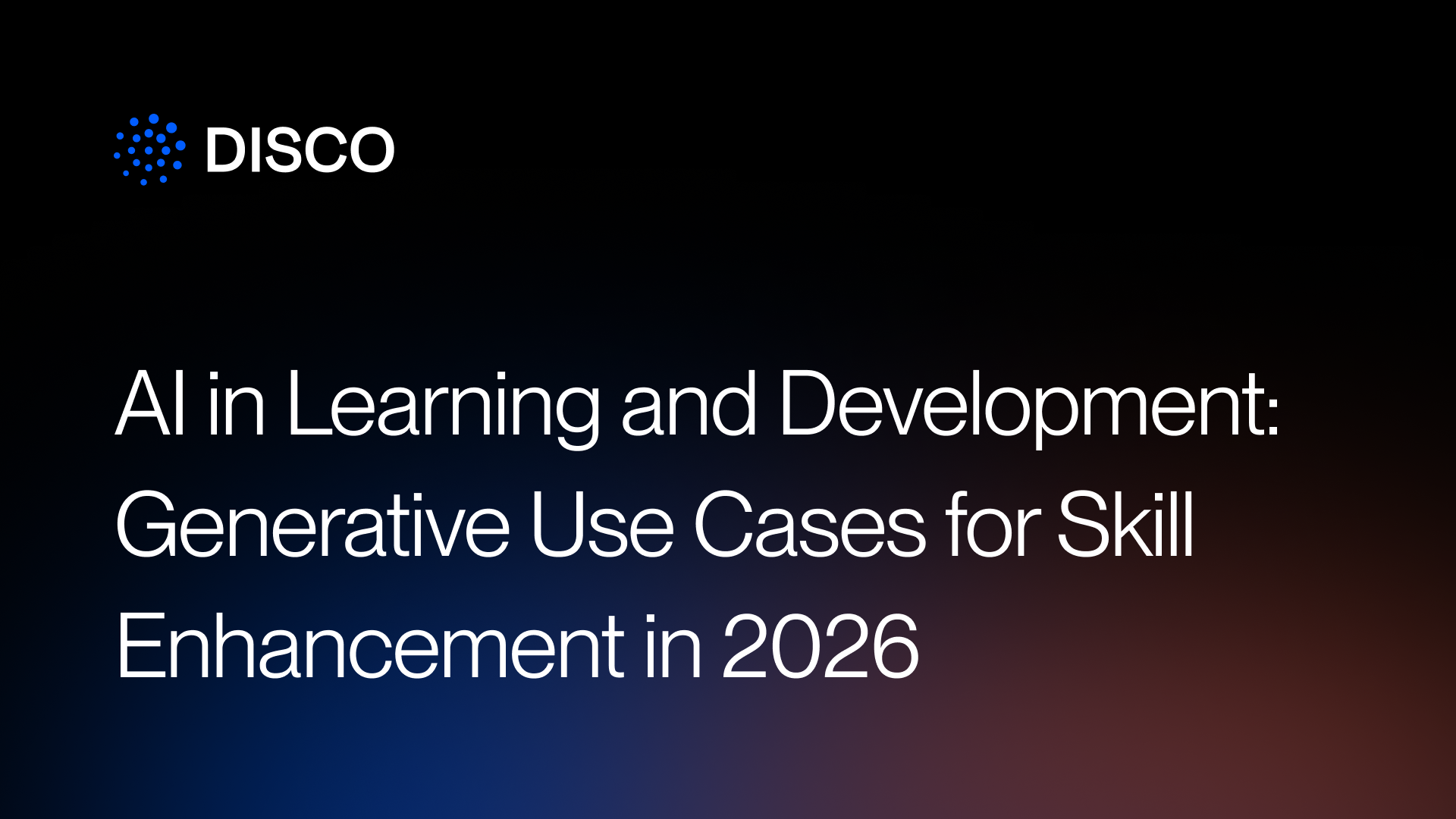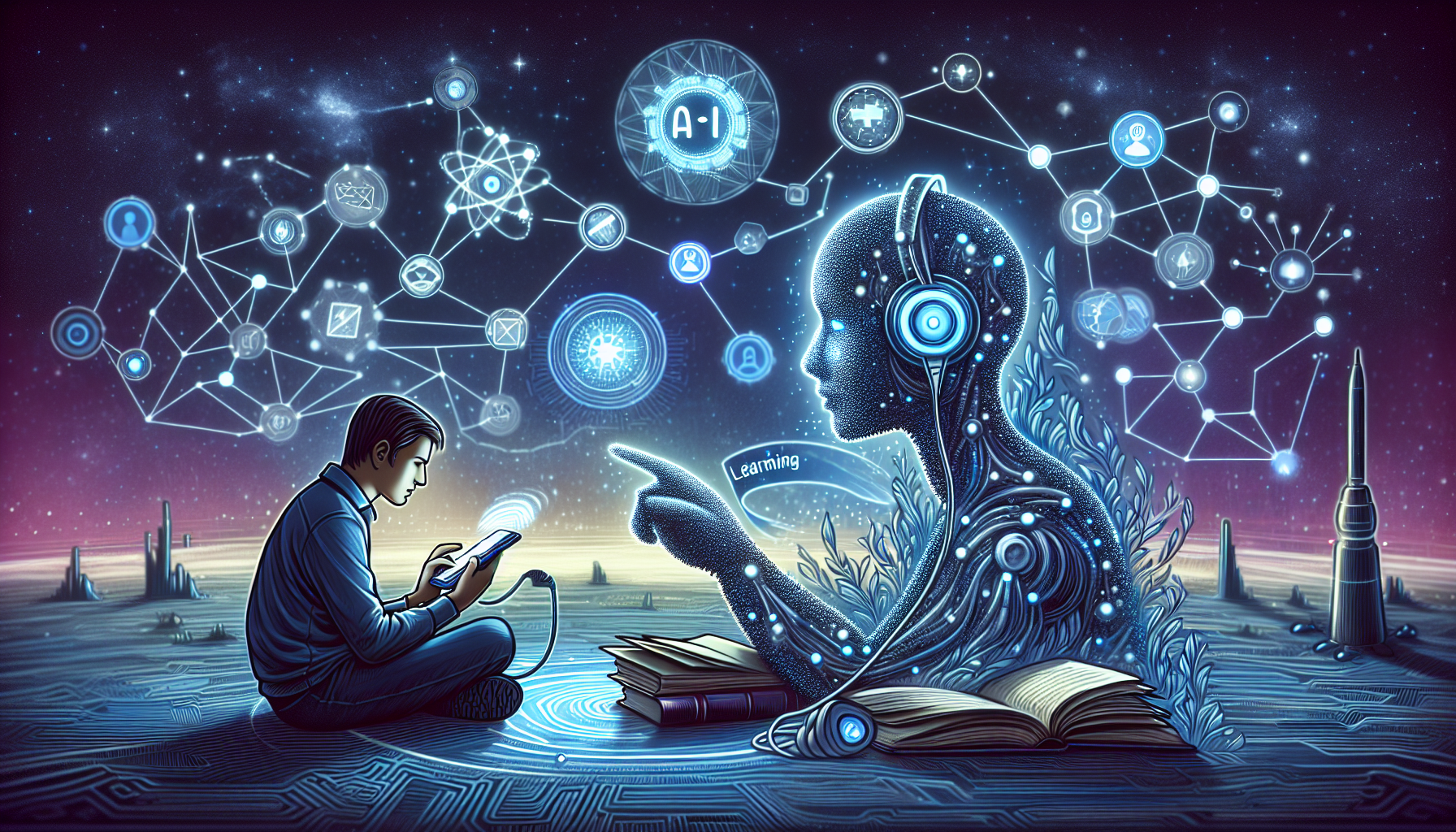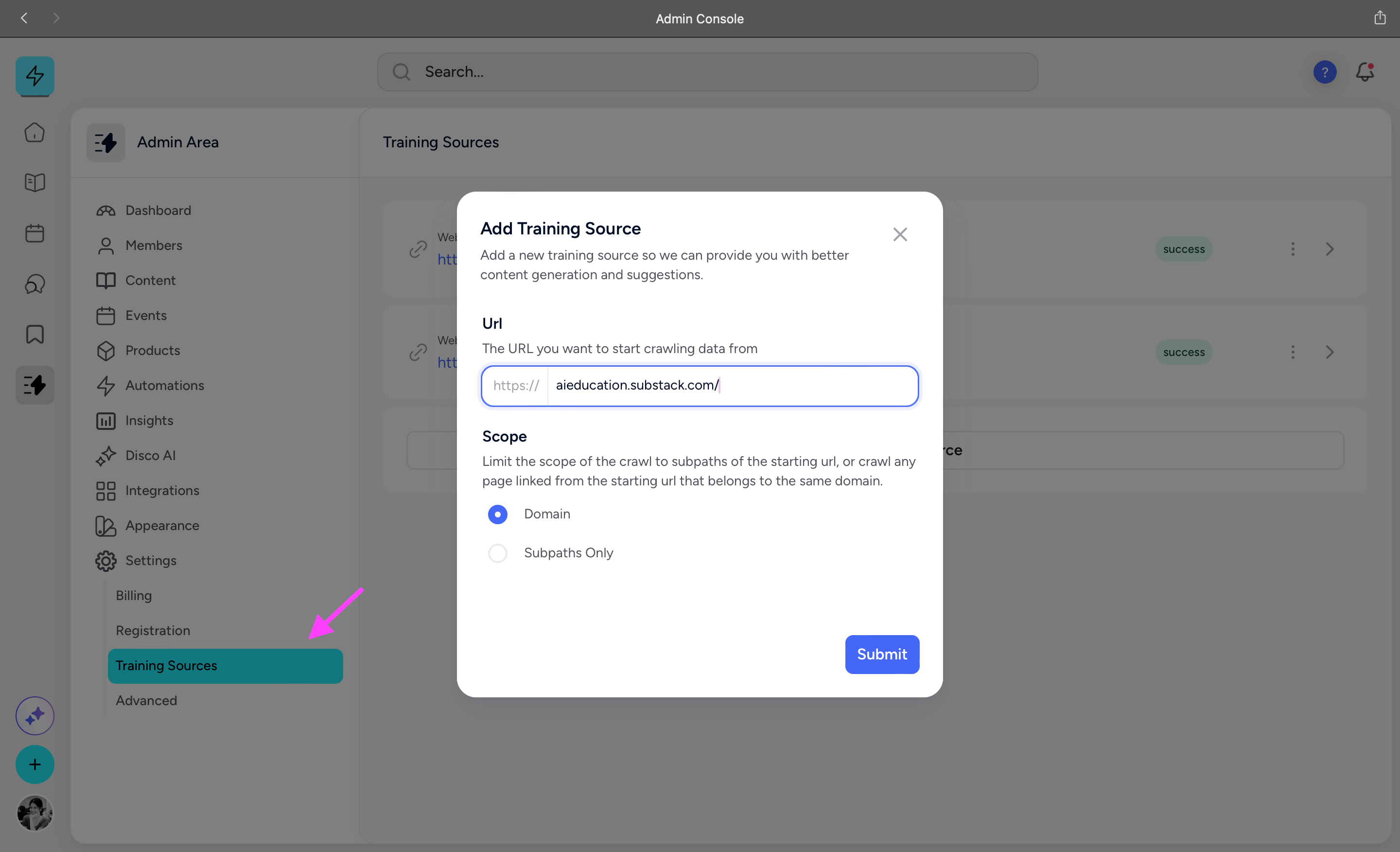AI in Learning and Development: Generative Use Cases for Skill Enhancement in 2026

TL;DR
- What it enables: AI transforms corporate learning through personalized experiences, automated content creation, and precise skill gap identification.
- What it includes: Generative AI tools, adaptive learning platforms, data analysis capabilities, and intelligent chatbots for real-time support.
- Key elements: Machine learning algorithms, natural language processing, multimodal content formats, and performance-based content adjustment systems.
- Top 5 use cases for 2026 include: diverse content generation, personalized learning paths, AI knowledge tools, data-driven insights, and skill gap analysis.
- Why it matters: AI creates more efficient, engaging training programs while reducing administrative burden and improving learning outcomes.
The Current State of AI in Learning and Development
According to Donald Taylor, AI in Learning and Development is in its early stages, primarily used for routine tasks like content creation. Most organizations are still experimenting with AI rather than using it extensively. The focus is on learning experience design (LXD) for content generation and curation, with a need for L&D practitioners to explore AI’s potential.
The 2023 State of AI Report highlights advancements in generative AI models like GPT-4, which have practical applications in creating adaptive and personalized learning experiences. Generative AI has attracted over $22 billion in investment, reflecting confidence in its potential to transform L&D. Key AI companies drove significant gains in the S&P 500 in 2023, indicating a positive growth trajectory in the AI industry.
The global AI market was valued at $142.3 billion in 2023, with a significant impact on education and corporate training. Enterprises are increasingly adopting AI for:
- employee training
- automating administrative tasks
- personalizing learning experiences using machine learning to customize learning experiences and automate assessments
- improving student outcomes
Additionally, natural language processing plays a crucial role in curating content and engaging learners in conversation.
How Corporate Learning Has Evolved
AI has significantly evolved corporate learning by personalizing educational content, automating content creation, and precisely identifying skill gaps. These advancements, as highlighted by Josh Bersin, enable organizations to offer tailored learning experiences that are continuously adjusted based on real-time data and the learner's progress, evaluating learning efficacy through data analysis and adjusting content based on performance.
In just a year, corporate learning has evolved from Learning in the Flow of Work to incorporating Generative AI. This includes AI-generated and AI-curated content formats, capability academies, talent marketplaces, and user-generated systems.

Generative AI tools streamline the creation of up-to-date training materials, while AI-driven insights facilitate targeted upskilling and reskilling programs. Despite challenges such as data privacy and rapid technological changes, AI’s integration into corporate learning strategies ensures a more efficient, engaging, and effective development process for employees.
Benefits of AI in Learning and Development
Some of these benefits include:
- Making training programs faster and more efficient by identifying knowledge gaps and developing specific skills within learning content
- Providing proactive support to ensure that learners are always on the right track
- Enhancing performance and overall learning experience
AI has the potential to transform learning and development by automating tasks, generating insights, and personalizing learning experiences. The collection of information, performance evaluation, and provision of immediate, accurate results are made possible by AI-driven tools, facilitating learning as part of the work process.
These tools also reduce the complexity of content creation, allowing for the development of effective and engaging training materials based on modern learning techniques. Generative AI tools, in particular, can consolidate and reorganize information swiftly, making the learning process more efficient.
5 Generative AI Use Cases in Learning and Development
A plethora of applications in L&D is brought forth by generative AI, which notably simplifies and accelerates the content creation process. For instance, generative learning platforms like Disco AI can generate content and learner activities rapidly, making it easier to develop comprehensive training programs.
This capability is invaluable for learning organizations looking to keep their training materials up-to-date and relevant. Disco AI also helps learning designers design curricula based on their learner’s data, ensuring that the educational content is tailored to the specific needs and preferences of each individual. Additionally, AI-driven platforms enable adaptive learning by assessing learners' capabilities and dynamically adjusting content to cater to different learning styles.
These use cases of AI in learning and development are based on insights from Josh Bersin, who highlights how AI is rapidly transforming corporate learning by enhancing content creation, personalizing learning experiences, and identifying skill gaps.
Use Case #1: Generating Content with Diverse Learning Formats
By integrating multimodal learning experiences, including text, audio, and video, AI caters to a variety of learning formats.
Whether they prefer reading, listening to audio, or watching videos, AI ensures that there is a suitable option for everyone. This adaptability not only caters to different learning styles but also enhances the overall retention and application of knowledge.
Additionally, natural language processing plays a crucial role in engaging learners and providing real-time feedback.
AI tools can create personalized learning paths that adjust lessons to different paces and learning preferences, providing greater access to educational content tailored to individual needs. AI-generated content can make learning more engaging, increasing motivation and participation among learners.
Tools like Disco AI offer suggestions to boost engagement, enhancing the overall learning experience and effectively tracking the learner’s progress through learning management systems.
Capabilities of Disco AI:
- Content Generation: It creates AI-generated learning content from texts, images, logos, and other brand assets.
- Course Design: Develop quizzes, lesson plans, course outlines, and learner activities tailored to individual needs.
- Video Production: Produce video assets such as summaries, subtitles, transcriptions, and chapters.
- Educator Training: Be trained by educators using their knowledge base and learner data to provide accurate content.
- Engagement Enhancement: Suggest answers to member queries and boost engagement with AI-powered posts.
Experience how Disco AI generates an entire curriculum in seconds:
Use Case #2: Personalized Learning Experiences with AI
AI can customize learning paths to individual needs, surpassing traditional models that assign paths based on job roles.
By understanding content details, AI, powered by machine learning, personalizes the learning experience more effectively than cluttered learning experience platforms (LXPs), which often fail to grasp content specifics. Machine learning also automates content curation, ensuring learners receive the most relevant and high-quality resources.

Personalized learning experiences are primarily achieved through AI, which customizes educational content according to individual skills gaps, career aspirations, and learning styles. AI-driven insights allow for constant monitoring and adjustment of learning plans, maximizing the effectiveness of each employee’s learning journey.
AI algorithms analyze large datasets to create personalized pathways, enhancing engagement and efficiency. Recommendations are generated based on past performance, interests, and goals, ensuring finely tuned learning experiences that increase successful skill acquisition.
In short, AI can adjust content based on job titles, interests, and previously consumed content, promoting self-directed learning and improving overall performance.
Although still in its early stages, Disco AI helps personalize the learning experience with its groups/subgroups feature. This feature can create mini-communities to increase engagement and help large organizations manage their members.
Here’s how you can effortlessly manage learners with groups feature:
Use Case #3: Replacing Traditional Training with Knowledge Tools
Certain traditional training methods stand to be replaced by AI, using intelligent agents or chatbots that offer immediate information and problem-solving capabilities. These AI-powered tools offer immediate assistance, making it easier for employees to find solutions and complete tasks efficiently. By providing real-time support, AI enhances the learning process and improves overall learner performance.
AI can also assist in identifying knowledge gaps where employees require further development.
By analyzing data, AI pinpoints these gaps and provides targeted recommendations to close them. This approach ensures that training content is always relevant and targeted, addressing the specific needs of learners and automating the creation of learning materials aligned to these competencies.
Use Case #4: Enhancing Learning Through Data Analysis
AI significantly enhances learning through advanced data analysis by swiftly processing large datasets and avoiding human biases. This capability allows AI to uncover patterns, trends, and correlations within extensive datasets, providing valuable insights that inform training programs and learning strategies.
AI-driven data analysis helps organizations make informed decisions quickly, centralize learning KPIs and metrics, and streamline data management, thus enhancing the overall efficiency of the learning process.
By automating routine tasks, AI enables analysts to focus on strategic problem-solving, improving the quality and impact of data-driven insights, which significantly enhances the learning experience.
Educators can train the Disco AI model with their knowledge base by simply adding a training source. Once the data is integrated, Disco AI analyzes it, allowing the chatbot to provide accurate and context-specific answers based on the knowledge base and learner data available on the platform. This analysis helps in tracking the learner's progress and adjusting learning plans based on performance.

This capability significantly enhances how educators design their curriculum, ensuring that the content is both relevant and personalized.
Use Case #5: Identifying and Addressing Skill Gaps
Identifying and addressing knowledge and skill gaps efficiently is one of the most potent capabilities of AI in the field of L&D. By analyzing large datasets, AI technologies can:
- pinpoint areas where employees require further development
- provide unique insights that traditional methods might miss
- predict outcomes and suggest specific content based on past performance and individual goals
- enable adaptive learning by assessing learners' capabilities and dynamically adjusting content to cater to different learning styles
The proactive nature of AI-driven skill gap identification offers insights even before the business performance is impacted. This allows organizations to address skill gaps swiftly, ensuring that training programs are always relevant and targeted.
Comprehensive upskilling and reskilling programs, informed by AI, can employ various training modalities to close these gaps, making the learning process more effective and efficient.









